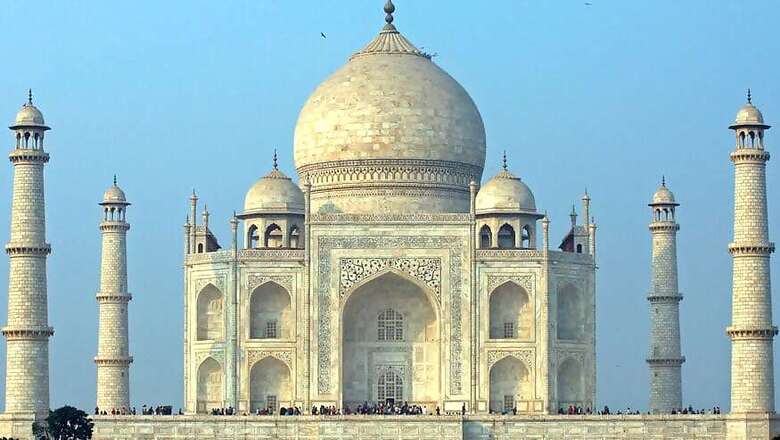
views
New Delhi: The Supreme Court on Thursday slammed the Centre, the Uttar Pradesh government and Taj Trapezium Zone (TTZ) authority for their failure to restore the pristine glory of Taj Mahal and asked what would happen if UNESCO withdraws the world heritage site tag of the iconic monument.
The apex court came down heavily on the Uttar Pradesh government for filing a draft report of the vision document on protection of the Taj Mahal and observed it was "surprising" that the Archeological Survey of India (ASI), which was responsible for preservation of the ivory white marble mausoleum, was not even consulted in the process.
A bench of justices Madan B Lokur and Deepak Gupta also wondered as to how 1,167 polluting industries were operating in the TTZ area and said that the TTZ authority, which was set up following an apex court order of 1996, was a "flop" and it appeared that a 'tamasha' (drama) was going on in the matter.
TTZ is an area of about 10,400 sq km spread over the districts of Agra, Firozabad, Mathura, Hathras and Etah in Uttar Pradesh and Bharatpur district of Rajasthan.
"The UNESCO's world heritage centre is in Paris. Have you been filing management plan (of Taj Mahal) before the world heritage centre of UNESCO? This is not being filed. What will happen if the UNESCO says that we will withdraw the world heritage tag of Taj Mahal," the bench asked Attorney General K K Venugopal.
Responding to it, Venugopal said, "It will be great, great embarrassment for the country" and "we cannot afford to get it (Taj Mahal) removed from the list of UNESCO's world heritage site".
The bench, while making it clear that somebody has to take responsibility for protection of the Taj Mahal, asked the Attorney General to "categorically and unequivocally" apprise the court by July 30 as to which departments of the Centre and Uttar Pradesh government would be responsible for maintenance and protection of TTZ.
It also directed the authorities to inform it by July 30 about the short term measures which were essential and needed to be acted upon immediately for protection of Taj Mahal and TTZ.
"We would also like to know from the government of India whether the authorities have submitted the management plan to the world heritage centre of UNESCO at Paris for Taj Mahal," it said.
The bench came down heavily on TTZ authority and said it has done nothing and the situation would not have become so serious if the authority would have done its work properly.
At the outset, the bench pulled up the Uttar Pradesh government for filing a draft report of the vision document and asked whether the apex court was supposed to vet it.
"Why have you given a draft plan? Are we supposed to vet it for you? Is it our job to vet it," the bench said, adding, "What is this going on? Are we supposed to correct your draft report?".
"Is this the kind of concern which you are showing? What is this happening?," the bench said.
Additional Solicitor General (ASG) Tushar Mehta, who was appearing for the state, said that the draft report of vision document was prepared as per the apex court's directive and it was prepared by School of Planning and Architecture in Delhi and not be the Uttar Pradesh government.
"The attempt is to show our bonafide. Now, there will be consultations on it and within a period stipulated by the court, the final report will be prepared," the ASG said.
The bench then referred to an affidavit filed by TTZ and told Venugopal, "It says 1,167 polluting industries are right there. This is the figure by the officials".
The Attorney General said these industries were running on "clean fuel" and told the bench that draft report was prepared as per court's direction and the apex court should tell the authorities as to what they should do.
"Frankly, what the Supreme Court has undertaken is so massive," he told the bench and said tremendous efforts were put in for preparing the draft report and Rs 28 lakh was spent for it.
When the bench observed that it was only a draft report and it could be changed later, Venugopal said, "it cannot be in a final form as other stakeholders can give their suggestions on it".
"You are not doing us a favour. Lets be clear about it," the bench said.
During the hearing, the bench took exception that affidavits were filed in the matter by Ministry of Tourism, Ministry of Environment, Forest and Climate Change, the TTZ authority and other agencies.
The top court also said that the draft report be supplied to a panel of conservation experts, including INTACH (Indian National Trust for Art and Cultural Heritage), ICOMOS (The International Council on Monuments and Sites) and the Aga Khan Foundation, so that they could also give their comments and suggestions on the draft report within four weeks.
It said that draft report be supplied to environmentalist M C Mehta, the petitioner in the case, so that he could also give his suggestions.
The court has posted the matter for hearing with regard to draft report on August 28.
The apex court has been monitoring development in the area to protect the Taj Mahal, built by Mughal emperor Shah Jahan in the memory of his wife Mumtaz Mahal at Agra.
Its construction was completed in 1643 but work continued on other phases of the project for another 10 years. The ivory white marble mausoleum is a UNESCO World Heritage Site.




















Comments
0 comment